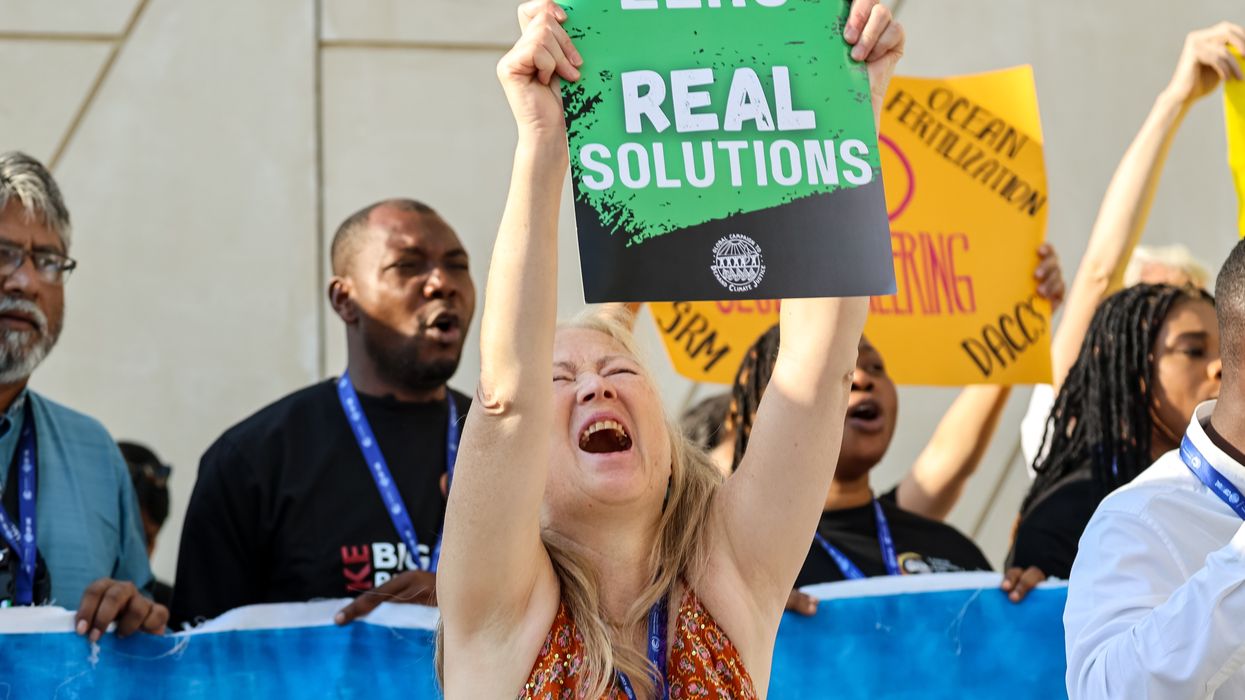Many of the lobbyists represent companies that have developed CCS projects against the advice of climate and energy experts who say a phase-out of all fossil fuel emissions is needed to limit planetary heating to 1.5°C, or as close to it as possible.
More than 2,400 fossil fuel industry representatives are at the meeting, which is scheduled to end December 12. CCS has some of the most prominent representation at COP28, according to The Guardian.
"Thousands of fossil fuel lobbyists are roaming these halls alongside their peers, advancing dangerous distractions like carbon capture and storage... while communities enduring the greatest impacts from the climate crisis are having our voices silenced."
Representation for countries that are already facing climate catastrophes including prolonged drought, famine, and sea level rise has been dwarfed in comparison, with 366 people attending on behalf of Somalia, 79 representing Tonga, 56 representing the Solomon Islands, and just seven in attendance for Eritrea.
The CCS bloc also outnumbers Indigenous representatives by 50%, reported The Guardian.
"Thousands of fossil fuel lobbyists are roaming these halls alongside their peers, advancing dangerous distractions like carbon capture and storage, trying to block a fast, fair, forever fossil fuel phase-out—while communities enduring the greatest impacts from the climate crisis are having our voices silenced and our lives treated as a worthy sacrifice for profit," Blessed Chidhoni of the Global Campaign to Demand Climate Justice told the outlet.
Lili Fuhr, director of CIEL's fossil economy program, said COP28 has invited more than 470 lobbyists to speak out in favor of "the fossil fuel industry's lifeline and... their latest excuse and delay tactic."
As Common Dreams reported this week, a recent draft of the Global Stocktake that delegates are working to finalize showed how powerful fossil fuel-producing countries are pushing for an agreement that would allow "abated" emissions—those that are "captured" by CCS technology and stored underground or beneath the seabed or "utilized" to make fertilizers and other products.
"The force with which the fossil fuel industry and their allies are coming to Dubai to sell the idea that we can 'capture' or 'manage' their carbon pollution is a sign of their desperation," said Fuhr. "We must not let an army of carbon capture lobbyists blow a gigantic loophole into the energy package here at COP28."
As Common Dreams reported in May, energy-intensive carbon capture technology would increase energy consumption at fossil fuel-fired plants by 20% while also worsening environmental injustice by subjecting people in the surrounding area to increased levels of smog, benzene, and formaldehyde pollution.
Critics say CCS is far from a solution to the fossil-fueled planetary heating crisis, as policymakers at COP28 have proposed setting up infrastructure capable of capturing just 1.2 gigatonnes of carbon emissions—only 3% of global emissions in 2022.
"CCS is an unproven technology and a dangerous distraction, which enables big polluters to keep destroying communities and the environment," said Climate Action Network International.
In an analysis last month, CIEL noted that the U.S. "is the epicenter of the global push for CCS, with a long history of using captured carbon dioxide for enhanced oil recovery and extraordinary subsidies for carbon capture."
"The accelerating efforts to build ever more dangerous, unnecessary, and expensive infrastructure offshore should be abandoned, and subsidies for CCS should be eliminated," said Steven Feit, CIEL's senior attorney and legal and research manager.
One major U.S. CCS project, Petra Nova, shut down in 2020 after capturing 3.8 million tons of carbon dioxide emissions in its first three years. Developers had projected it would capture 4.6 million tons.
Another project in Western Australia—the largest carbon capture and utilization/storage endeavor in the world, missed its capture targets by about 50% in the first five years, and The Guardianreported this year that emissions have now risen by 50%.
"CCS's track record is riddled with failures and warning signs about the technology's feasibility and safety," said Nikki Reisch climate and energy program director for CIEL. "CCS is a false promise that only helps to keep fossil fuel facilities running and oil and gas fields pumping."

